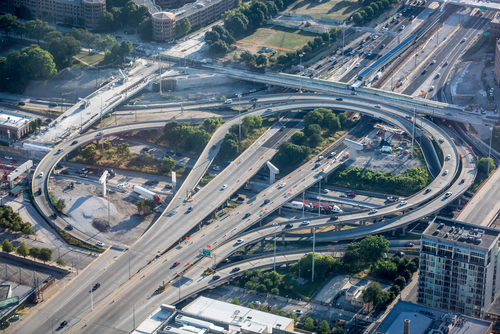
The Senate Environment and Public Works (EPW) Committee on Tuesday unanimously approved the largest highway legislation in U.S. history.
America’s Transportation Infrastructure Act (ATIA) of 2019, S. 2302, authorizes $287 billion over five years, including $259 billion for formula programs, to maintain and repair the country’s roads and bridges. U.S. Sens. John Barrasso (R-WY) and Tom Carper (D-DE), chairman and ranking member of the EPW committee, introduced the legislation with Transportation and Infrastructure Subcommittee leaders U.S. Sens. Shelley Moore Capito (R-WV) and Ben Cardin (D-MD).
“Our committee has taken a significant step in improving our roads and bridges,” Barrasso said. “America’s Transportation Infrastructure Act will grow our economy, improve road safety, expedite important projects, and enhance quality of life for the American people. Our bipartisan legislation will help rural communities in Wyoming and major urban areas around the country.”
Capito’s office said the $287 billion authorization total represents an increase of over 27 percent from FAST Act levels.
Barrasso and Carper wrote in a July 29 op-ed that across the country nearly 200,000 miles of major highways and 47,000 bridges are in need of repairs. “Our response is simple. Give states the money, flexibility, and incentives to build safer and more modern highway and bridge systems that will connect more Americans, power our economy and endure the test of time for the next decade and beyond. Our legislation streamlines government regulations while prioritizing environmental protection so that projects are built better, faster, cheaper and smarter.”
Other provisions of the bill will codify key tenets of the “One Federal Decision” policy, which will streamline project delivery and federal approvals, and establish a program to support projects that test and improve the resiliency of roads and bridges to natural disasters and extreme weather events.
Barrasso and Carper wrote that the bill dedicates $5.5 billion over the five-year period in a new resiliency program dedicated to protecting highways from storms, fires, floods, and rockslides.
The legislation will also authorize a mix of formula-based and grant-based programs to begin to reduce transportation-related emissions.
“Our climate is changing, and we recognize that,” the senators wrote. “We also recognize the need to reduce carbon emissions from our transportation infrastructure. Dedicated funding and new incentives in our legislation will help states reduce their total transportation emissions. For example, states can get funding to help mitigate traffic congestion in urban areas. They also can choose to develop plans to reduce transportation related emissions and compete for additional funds if they meet or exceed them.”
Additionally, the broader legislation includes a measure Capito introduced with U.S. Sen. Sherrod Brown (D-OH) and others to improve America’s bridges. The Bridge Investment Act would establish a competitive grant program to assist in the repair and replacement of deficient and outdated bridges and ease the national bridge repair backlog. It authorizes $3.265 billion from the Highway Trust Fund and another $3.265 billion in appropriations to fund bridge investments, spread over five years, for a total of more than $6.5 billion in new funding, Capito’s office said in a statement.
State and federal trade organizations are supportive of the bill because of what it will bring to U.S. infrastructure improvement and what it will allow the industry to create and develop going forward.
“Getting this important legislation enacted by next fall is something every state DOT strongly supports,” Jim Tymon, executive director of the American Association of State Highway and Transportation Officials, said. “For state DOTs, it is absolutely crucial to get the next federal transportation bill done on time, without resorting to a series of short-term program extensions. When federal funds are predictable and stable, state DOTs are able to fully focus attention on delivering critical projects that improve safety, quality of life, and economic opportunities for everyone.”
The National Stone, Sand & Gravel Association (NSSGA) President and CEO Michael W. Johnson said that aggregates producers are ready to build and rebuild America’s transportation infrastructure.
“The ATIA will provide much needed funding to maintain and repair America’s roads and bridges. This is a positive step in addressing necessary infrastructure investment,” Johnson said. “Our nation’s roads, bridges, highways and the many other aspects of our infrastructure are in need of repair, improvement and advancement to meet the needs of today and tomorrow. Bold steps such as [this] bill are critical to address infrastructure investment across the board for America’s economic future.”
In her statement regarding the legislation, Capito acknowledged not only the direct benefits to U.S. roads and bridges, but also to the continued deployment of broadband infrastructure in rural America.
“Not only will this comprehensive, bipartisan legislation help us rebuild and repair America’s infrastructure system, but it will also help create new infrastructure opportunities now and for future generations,” Capito said.
The U.S. Chamber of Commerce also lauded the five-year highway bill, tweeting, “This is a great bipartisan first step to address our nation’s crumbling infrastructure! #InfrastructureNOW”
The final task of determining financing for the bill’s provisions will be left for the Senate Finance Committee. A House of Representatives version of the transportation bill is not expected until early 2020.
NATSO, the national association representing the travel plaza and truckstop industry, was particularly impressed with the legislation’s commitment to ensuring that highway and infrastructure programs are sufficiently funded without repealing the federal prohibitions on existing interstate tolling or rest area commercialization.
“NATSO is supportive of the Committee’s effort to establish a grant program that would stimulate private investment in electric vehicle charging and natural gas refueling stations along designated highway corridors. Private sector investment in alternative fuels such as electricity and natural gas are key to meeting the fueling needs of the traveling public,” NATSO President and CEO Lisa Mullings wrote in a statement. “It is NATSO’s hope that policymakers will steer grants toward projects where private capital is being placed at risk, rather than toward public utilities that inappropriately use their monopolistic stature to crowd out private investment in EV charging infrastructure.”